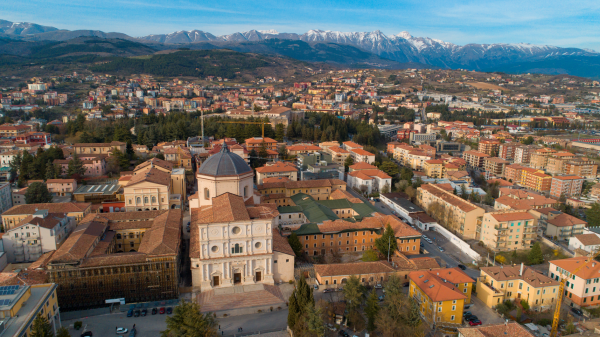ECR Summit
10 Nov 2022 09h00L'Aquila, Abruzzo region, Italy
|
General information
The ECR Group's 2022 Localism Summit will be held in l'Aquila, capital of the Abruzzo region. Marco Marsilio, President of the Abruzzo region, will be hosting this event. The topics to be discussed are:
- Climate change, hydrogeological instability, and natural disasters: what assistance can local and regional authorities expect from the European Union?
- Tackling demographic decline and the depopulation of inland areas.
Topics
1. Climate change, hydrogeological instability, and natural disasters: the assistance that local and regional authorities expect from the European Union.
While there is still much debate on the details, there is little doubt that climate change is a real phenomenon, which is having drastically negative effects on the environment and society at large. Droughts, storms, and an increasingly wild oscillation between extreme seasonal weather are only some examples that are causing devastating impacts across Europe. In Italy a phenomenon of particular concern is hydrogeological instability and earthquakes - increased rainfall in Italy's overwhelmingly mountainous terrain has meant that the occurrence of landslides, avalanches, and floods has increased.
Local and regional authorities are frequently at the frontline when it comes to dealing with natural disasters. But how can local authorities best prepare for potential disasters? Are emergency services better left in the hands of centralised national governments, or in the hands of those communities who know their own specificities better? This panel will also discuss the European dimension of these questions, such as what aid the EU can bring to local and regional authorities, and how such help can best be used whilst respecting the principles of proportionality and subsidiarity.
2. Tackling demographic decline and the depopulation of inland areas
As a whole, Europe faces numerous demographic problems, most notably a declining birth rate and an aging population. In peripheral, rural, and inland areas these issues are particularly acute. Over the past decades, large segments of the population have moved either to coastal areas or to urban centres, with younger people in particular moving to the latter in pursuit of career opportunities. This creates a number of issues for the areas and localities in question, with development and policy focused on big cities, which in turn causes them to attract and draw more people from rural areas.
In this panel, discussions will focus on the impact of these demographic issues, and what local and regional authorities can do to tackle them. With the convergence of EU policies on territorial and digital cohesion, how can depopulated rural localities take advantage of the economic and technological transformations to breathe new life into their communities? In the meantime, how do such authorities manage the costs and services for disproportionally older populations? And finally, what is the impact of demographic flows on the metropolitan areas the population of which grows very fast?
Why in Abruzzo?
The city of L'Aquila is the second largest city in the Abruzzo region, and is the capital of both L'Aquila province and of Abruzzo region.
L'Aquila and its surrounding region offer many relevant examples for the topics which are to be discussed. Tragically, in 2009 it was the epicentre of one of the most devastating earthquakes in Italy's modern history, which took over 300 lives and left over 40 000 homeless. The trials, successes, and failures Abruzzo faced in anticipating, surviving, and recovering from this disaster contain many invaluable lessons for local and regional authorities all over Europe.
Abruzzo sits in the centre of the Apennines, and as a region with a mostly mountainous interior, hydrogeological instability is a present and ongoing concern for the daily lives of its inhabitants. The way in which Abruzzo has dealt and will continue to deal with the effects of climate change on its native environment, infrastructure, and society is a relevant story for all local administrations.
Finally, it is the region of Marco Marsilio, who currently serves as its president. Mr Marsilio is also the president of the ECR Group in the CoR and a founding member of the Fratelli d'Italia party.
Programme
8.30-8.55 a.m. | Registration |
| Introduction to the event
|
9.00-9.20 a.m. | Welcome remarks
|
9.20-10.20 a.m. | Round Table I: Climate change, hydrogeological instability, and natural disasters: the assistance that local and regional authorities expect from the European Union Moderator: Paolo Pacitti, Editor-in-chief of RAI Abruzzo
|
10.20-10.45 a.m | Press briefing and signing of the political declaration by representatives of local and regional governments in the ECR Group |
10.45-11.45 p.m. | Round Table II: Tackling demographic decline and the depopulation of inland areas Moderator: Luca Prosperi, Editor-in-chief of ANSA Abruzzo
|
11:45-11:50 p.m. | Video presentation "The rebirth of L'Aquila" |
11:50-12:50 p.m. | Round Table III held by the ECR group's Young Elected Politicians: Young MPs, mayors and councillor discuss the regions of the future Moderator: Carmine Perantuono, Director of Rete 8
|
12:50 – 13:00 pm | Conclusions
|
13.15-14.15 p.m. | Buffet lunch in the Regional Council building |
14:15 – 15:30 p.m. | City tour |
Location

Abruzzo Regional Council, Via Michele Jacobucci 4, L'Aquila, Italy

